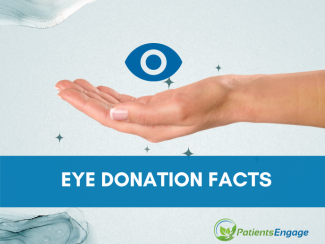
Dr Sunita Chaurasia, Senior corneal faculty at KAR Campus, Hyderabad and Medical Director to The Ramayamma International Eye Bank explains the state of eye banking in India and busts the myths surrounding eye donation. She reminds us how simple the process is and how noble the act is.
What is eye donation?
Eye donation is the process in which eyes/corneas are donated by the family members after the death of a person. While the term “eye donation” is common, there is no whole eye transplantation. Most often only the front part of the eyeball,corneo -scleral tissue is recovered for transplantation. The cornea is the clear dome-like window covering the pupil that lets light pass through to the retina, allowing us to see.
Corneal transplantation is the most common type of eye transplant because a healthy, clear cornea is needed for good vision. A cornea that is injured or damaged by disease can become swollen or scarred which can cause blurry vision or permanent loss of vision. Hence,the eye bank personnel retrieve the corneo-scleral rims of the diseased donor, which is then utilized for a needy recipient after a thorough donor evaluation screening.Whole eye transplants are not currently possible and eye transplantation refers to replacing the recipient’s diseased cornea with a healthy donor cornea.
This is the strategy and standard surgical procedure to help restore the sight of those who are suffering from corneal blindness.The donor corneo-scleral rim is also utilized for treating several other eye conditions such as providing healthy cells for ocular surface diseases and glaucoma surgeries.
What is an eye bank?
Eye banks are the organization for retrieving, evaluating and distributing corneas to the corneal surgeons. It is run by dedicated team of individuals who are involved in counseling the family members of the deceased, procuring donor corneas from the deceased after taking the consent of the family members, processing evaluating and distributing to surgeons for cornea transplantation surgery.
Who benefits from eye donation?
Persons with corneal blindness can benefit from eye donation, thus empowering them and their families to live a respectful and productive life.The various causes of corneal blindness include infections keratitis), trauma, congenital corneal diseases and post cataract surgery complications.
State of eye banking? Is there a shortage?
In India, there are over 700 eye banks registered, but only 10% of eye banks are functional and responsible for 80% of transplants done in the country. According to NPCB (National Program for control of blindness) there are 1.2 million corneal blind and 25,000-30,000 get added annually. As per the EBAI statistics (before Covid-19 Pandemic), eye banks in India were harvesting about 50,000 corneas and only 25,000 corneas are distributed for transplant surgeries (50% utilization rates as many donor corneas cannot meet the criteria of corneal transplantation in recipient eyes).
The perceived need of the country, is to be able to perform 100,000 transplants for which around 200,000 corneas should be harvested, taking the present trend of 50% utilization rate in order to reduce the corneal blindness in the country. Following the Covid-19 pandemic, the number of donor corneas retrieved and transplanted staggered to much lower figures, thereby further increasing the shortage of corneas that existed before.To bridge this gap, LVPEI has been making all efforts to reduce the waiting period for corneal transplant by increasing eye donation through different strategies. LVPEI has eye banks in all its tertiary centres (Hyderabad, Visakhapatnam, Bhubaneswar and Vijayawada). LVPEI network eye banks also ensure that quality measures and advanced techniques are adopted, upgraded, and implemented with developments in changing strategies of managing the corneal diseases. LVPEI has also established eye banks at AIIMS Rishikesh, BHU Varanasi and GMCH Guwahati, in collaboration with The Hans Foundation.
Eligibility for eye donation:
Any person of any age
- After death within 6-8 hrs. and if the body is refrigerated within 6 hrs. of death, can recover corneas up to 24 hrs.
- Person having any disease except contraindicated
- Person wearing spectacles
- Persons having cataract, prior ocular surgeries and blind due to retinal disease
- Persons having diabetes and hypertension
Eye donation can be made only after thorough screening of medical history and a written consent from the family of the deceased.
When must the decision for eye donation be made?
Family of the deceased must take decision within 6 to 8 hrs. of death and inform the nearest eye bank.
Process of eye donation:
Corneas should be ideally harvested within 6-8 hrs of death after taking the consent from a family member of the deceased who is in a lawful position to execute donation.
A trained technician or an ophthalmologist can recover the corneas following all the aseptic methods. Harvested corneas are bought to eye bank in a corneal preservative solution (MK / Cornisol) and store them in a refrigerator where the temperature is maintained between 2° to 8° C until it is distributed for surgery. Corneas need to be evaluated under different microscopes (Specular and Slit lamp biomicroscope) to determine the quality of the corneas for its suitability for transplantation.
Eye bank draws blood samples from the deceased and tests for communicable diseases like HIV, Hep-B, Hep-C and Syphilis. If the cornea quality is good and donor serology status is negative, then the corneal tissue is ready for distributing to surgeons for transplantation surgery.
Best way to make an eye donation
A person’s wish of donating eyes must be shared among the family members, so that pledges are converted to eye donations. It is good to pledge one’s eyes, but the consent of the family members is very important, since the law mandates their consent prior to cornea retrieval.
Dos and Don’ts of eye donation
- Do pledge your eyes for donation.
- Do keep your donor card with you at all the times.
- Do encourage others to donate their eyes too.
- Do let your family know about your intentions to donate your eyes.
- Don’t waste time informing the nearest eye bank.
- Do inform the eye bank within six hours of the person’s death.
- Switch off the fans but keep the air-conditioner on.
- Close the eyelids of the deceased gently and cover them with moist cotton.
- Raise the deceased’s head using a pillow.
- Keep the death certificate ready upon arrival of eye bank team.
- Provide all the necessary social and medical history to the retrieval team for better utilization of corneas and not to pass any transmittable diseases to the recipient.
Facts about eye donation:
- Must happen within 6 to 8 hrs. after death
- Eye / Cornea retrieval takes only 20 minutes.
- Only cornea is used
- One pair of corneas will give sight to 2 to 4 blind persons
- No buying, No selling of human eyes is permitted
- No fee will be collected for cornea retrieval
- Confidentiality is maintained
- Corneas which are not suitable due to poor quality or contraindicated shall be given to Research and Training
Eye donation myths that we need to address
1. Body must be taken to hospital.
Fact: Corneas can be harvested at any place and there is no need for the body to be taken to the hospital.
2. Eyes must be donated before death
Fact: Eyes can be donated only after death of a person
3. Eye donation will cause a delay in funeral arrangement
Fact: There won’t be any delay in funeral arrangement as it takes only 20 minutes for the entire eye donation to be completed.
4. If I donate my eyes, it will leave holes in the eye socket causing face disfigurement
Fact: Eye donation does not cause any disfigurement of the face as only the cornea of the eye is removed and not the entire eye.
5. If I donate my eyes when I die, I will be blind by birth in my next life.
Fact: Gifting sight to someone is a divine gesture – something only a person with a lot of greatness in the heart can do. How can such a person be born blind in the next birth? This myth has stemmed out of ignorance and is a complete misconception.
6. I want to pledge my eyes, but I am worried about how my family and relatives will react.
Fact: Informing your family that you are planning to pledge your eyes will definitely be an emotional moment, as they love you and might not be able to think of a world without you. But you need to tell them that one day we will have to go and one of the good things we can do in this lifetime is to gift someone sight and in turn, a new life. If possible, you can also educate them about Eye Donation and convince them to pledge their eyes too.
7. I have a prior history of cataract and so I cannot pledge my eyes for donation
Fact: You can donate your eyes even if you have a previous history of cataract, provided you have been operated/treated for cataract or glaucoma.
8. Aged people cannot donate eyes.
Fact: You can donate your eyes, irrespective of how old you are. Practically, anyone who is above one year of age can donate their eyes. There is no upper age limit.
9. Eyes of Indian donors are not good for corneal transplant.
Fact: Eyes of any deceased person, irrespective of nationality/race/cast, can be used for corneal transplantation, post evaluation.
10. Corneal transplantation is just an experimental procedure.
Fact: Corneal transplant is a proven, successful, and routinely performed procedure that has gifted vision to millions of blind people across the world.
11. If I donate my eyes, it will be sold to the person who needs the transplant.
Fact: Eye donation is a noble cause. Selling/ buying human eyes is an illegal and a punishable offense.
12. If I have pledged my eyes for donation, no authorization/consent from anybody is required after my death.
Fact: Even if you have pledged your eyes for donation, the consent of your family member is essential for completing the process.
13. It is against my religion to become an eye donor.
Fact: All religions honor those who make selfless sacrifices. Eye donation is a noble, divine deed and all faiths support this cause. So do not hesitate. Donating your eyes will help a person in need and make you a better human being. Pledge to donate your eyes today.
So do not hesitate. Donating your eyes will help a person in need and make you a better human being. Pledge to donate your eyes today.

Dr Sunita Chaurasia is a Senior corneal faculty at KAR Campus, Hyderabad. She also serves as Medical Director to The Ramayamma International Eye Bank, since last 10 years.
She is a recipient of several awards, notable being the Achievement award at American Academy of Ophthalmology in 2013 and AIOC- IJO platinum award in the year 2020 for outstanding research paper in Ophthalmology. Her research focus areas are corneal endothelial Diseases and transplantation, Novel Corneal management therapeutics, Infections, Eye banking and
complex cataract scenarios.






